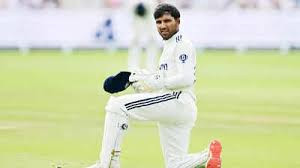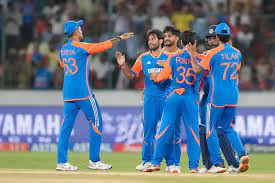“Mauka Milega, Ready Rehna”: Gambhir Mentors Jurel to Seize Unexpected Opportunity

IIE DIGITAL DESK : July 30, 2025 — India's high-voltage Test series in England, head coach Gautam Gambhir offered a simple yet powerful message to wicketkeeper-batsman Dhruv Jurel: “Mauka milega, ready rehna” — meaning, when your chance comes, be prepared. The words captured a broader ethos behind India's squad depth and mental readiness culture throughout the series.
With vice-captain Rishabh Pant sidelined by injury, Jurel stepped courageously into the role—not once, but twice. First at Lord’s in the third Test, and again at Old Trafford in the fourth Test—tests of nerves for the young substitute keeper. Gambhir’s mentoring proved prescient. The confident and composed performances from Jurel underscored the trust placed in India’s bench strength when called upon unexpectedly.
Pant's absence due to a finger injury handed Jurel a sudden responsibility—and Gambhir ensured Jurel was mentally primed. “He [Gambhir] wanted Jurel to believe he belongs when the opportunity comes,” a source explained. With no prior Test caps, the youngster’s calm behind the stumps and readiness to bat under duress spoke volumes about his temperament.
The coach’s leadership style has come under intense scrutiny during the England tour. Gambhir led a combative response to criticism following a draw in Manchester, refuting accusations of poor sportsmanship, and highlighting what he termed a UK team’s tendency to dictate terms—particularly during a spat with England’s Oval groundsman, where Gambhir grasped back at perceived overreach. (“You don’t tell us what to do,” he reportedly said.)
Ravichandran Ashwin observed that the Indian side becomes “a different beast” under pressure—suggesting the team thrives amid adversity, with leadership like Gambhir's reinforcing toughness.
Reflecting on India’s gritty draw in the fourth Test, Gambhir described his squad as fighters who “threw punches” and battled for every inch—urging his team to deliver “one final push” as England lead the series. His speech at the Indian High Commission in London echoed this resilient spirit.
Gambhir has repeatedly emphasized a merit-based, inclusive culture, promoting form and readiness over fixed hierarchies. On captaining, Shubman Gill called out that Gambhir and chief selector Ajit Agarkar imposed “no pressure,” encouraging leaders and players to express themselves freely.
Beyond XI selections, Gambhir affirmed the team won’t force Jasprit Bumrah to play all Tests, adhering to a planned three-match rotation and supporting inexperienced pacers as future pillars. This approach aims to preserve fitness while building a deep pace battery.
Overall, the “Mauka milega” message encapsulates cricketing values central to Gambhir’s tenure: readiness, responsibility, and calm under pressure. Jurel’s seamless integration into the squad highlights the success of that framework. It reflects how veteran players and support staff are expected to prepare for—and deliver when—their moment arrives.
If India can emerge victorious—or salvage pride in the final Test at The Oval, beginning July 31—it may owe a quiet debt to that philosophy: steady preparation meeting rare opportunity. Jurel’s innings behind the stumps might be remembered not for stats, but as proof of a system built on trust, belief, and timely mentorship.
Coach Gautam Gambhir’s message to Dhruv Jurel signalled trust in squad depth and readiness culture, reinforced by Jurel’s composed stand-in performances as wicketkeeper. It reflects broader team management values: preparedness, responsibility and seamless adaptability in high-stakes moments. Even without headlines, these moments shape championship-calibre squads.
You might also like!
















